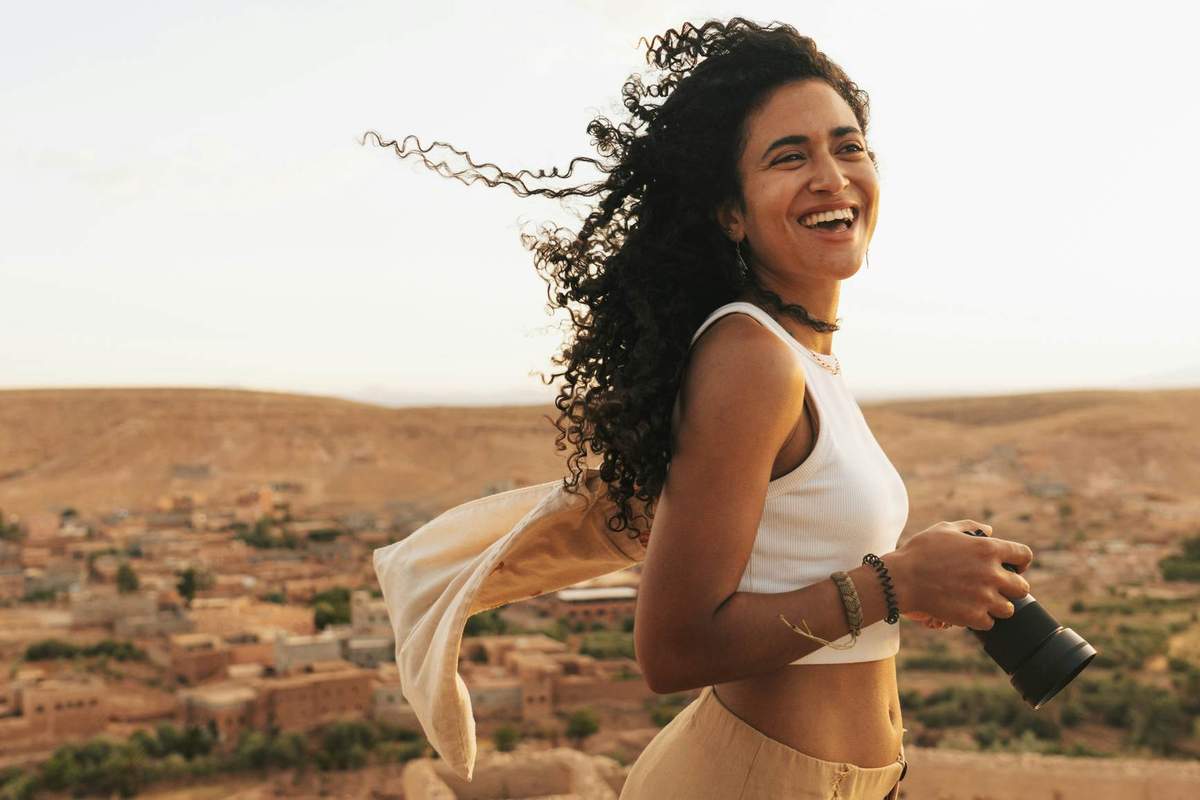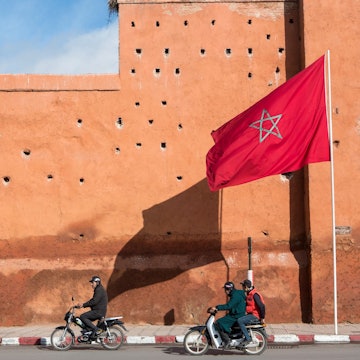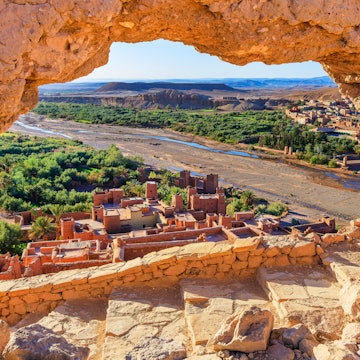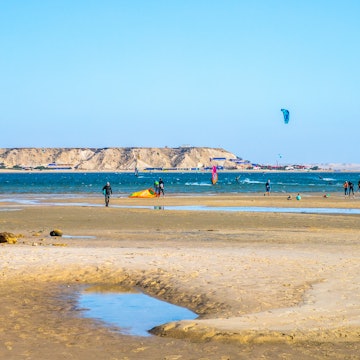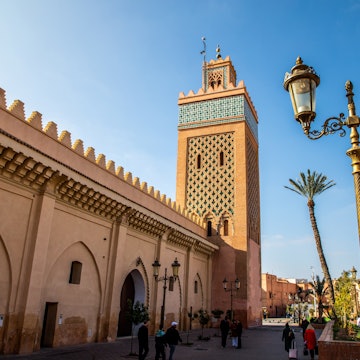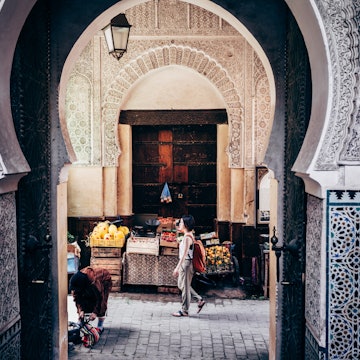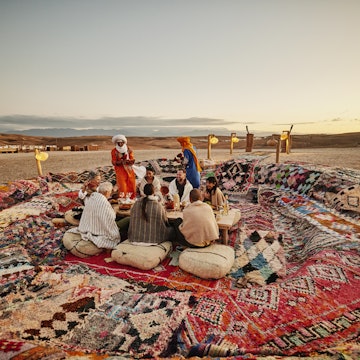

Bahia Palace in Marrakesh. saaton/Shutterstock
Marrakesh is known for being a budget-friendly travel destination accessible to all types of travelers, from backpackers to luxury lovers. Pick a neighbourhood to explore and set off through the streets, dropping by concept stores and artisans, visiting museums large and small, and sampling some great local cuisine.
Whether you're traveling cheaply or want to indulge without breaking the bank, let me help you find value as you explore the Red City.
Daily costs
Hostel bed in a shared room: Dh150-200
Double room in a simple riad: Dh500-800
Entry to historical sights: Dh20-50
Public transport ticket: Dh5
Coffee/mint tea: Dh6-12
Tagine from a street cafe: Dh50
Dinner in a licensed restaurant: Dh250
Cocktails at a rooftop bar: Dh120-150
Beer in a dive bar: Dh30-60
Sleep on the cheap
Marrakesh is synonymous with charming architecture and warm hospitality and, thankfully, this can be found in all price categories, whether you sleep on a local's sofa through Couchsurfing or rent a room via AirBnb or Booking.com.
The city also has excellent hostels, with spots like Equity Point and Central House Hostel offering high standards of accommodation in both dorms and private rooms. Plus, hostels are great for mingling with like-minded travelers.

Book luxe digs direct
If you dream of staying in a traditional riad, you're in luck: there are hundreds in Marrakesh, and the volume keeps prices down. With most hotels, booking directly will get you the best price. Avoid the very high season – around 24 December to 4 January – when rates are hiked by at least 15%.
Note: City tourist taxes of between Dh15 and DH30 per person per night (depending on your accommodation style and price) are paid in cash at the end of your stay so make sure you have some dirham for your check-out.
Stay central and walk
If you book a riad in the area of the city you are most interested in, you can pack comfortable shoes and enjoy the freedom of exploring on foot.
The medina is compact and mostly pedestrianized, though it can get a bit confusing to navigate; download Google Maps or Maps.me, as it can be handy to have an offline map. Locals may offer to guide you if you're visibly lost, but will expect a tip.
Take public transport, share a ride, or use an app
If you tire of walking, you can hail a taxi or take a bus. See the Alsa interactive bus planner for fare and route options.
If you're staying in a luxury hotel, you'll save money by hailing a taxi away from the hotel itself. While regulations require meters are used in taxis, enforcement is inconsistent, especially in Marrakesh. Insist the driver uses the meter, or agree on a fare before getting in, to avoid being overcharged.
Sharing taxis, known locally as "taxi collectif" is standard across Morocco. It's how the locals travel, and it's a great way to save money and connect with the Marrakchis.
Prefer the security of hailing a car with an app? Roby is the local version of Uber. It's a little more expensive than regular taxis, but if you're used to booking taxis via an app, it may save on the stress of haggling for fares.

Plan which sights are a must-see
The Yves Saint Laurent Museum and Jardin Marjorelle are the most popular and expensive of the city's tourist attractions. Purchase a combined entry ticket in advance to save on queuing time and to get any eligible discounts.
Other attractions in the city – like the Badia Palace, Bahia Palace, and Saadian Tombs – cost around Dh70 per person. Pick up a guidebook and research which attractions you want to visit if time or budget is a constraint.
Splash out on a pool pass
The weather in Marrakesh is perfect for being in, or by, a swimming pool. One way you can save money is by choosing accommodation without a pool and then purchasing a day pass at a more upscale hotel or country club for a relaxing escape.
There are heaps of passes granting access to the cities' top hotel pools and spas, so you can take advantage of the amenities without having to fork over extra money for every night of your stay. Prices range from Dh300 to Dh2000 per day (the latter would include a drink and three-course meal).
Find the best hammams to recharge
Marrakesh can get intense on all levels – noise, smell and pace – so, thankfully, the city offers plentiful places to retreat, whether it be one of the city's parks, gardens, spas or holistic centers. Relax in the shade of the city's free parks: Cyber Park, Agdal Garden and Lalla Hasna Park.
There are a growing number of yoga studios in the city. While yoga sessions can be arranged by some hotels, avoid paying the premium for a private class and look for a local studio.
For a real hammam experience, join the locals for a scrub down at Hammam Mouassine, one of the best-value (recommended) options. If you prefer to spend more on a private hammam ritual, an independent spa such as Hammam de La Rose charges from Dh300 for a 30-minute session.

Join locals and eat street food
The city streets and squares brim with street stalls and cart vendors selling seasonal local produce. Grab a fresh juice squeezed before you – an orange or pomegranate costs Dh20 for around 500ml.
Mechoui Alley is the go-to place for succulent slow-roasted sheep on coals and a local speciality, tajine (stew cooked in a terra cotta pot). Serving starts around noon, but don't want too long to eat – when vendors run out, they run out.
The Djemma El Fna food stands kick off around 4pm, and the square turns into an outdoor food festival with hundreds of stalls serving different local dishes: fish skewers, grills, soups and tajines.
Want to try more upmarket restaurants? The side streets of Gueliz are home to stylish bistros and contemporary dining. Some spots, such as the Loft, offer a discounted lunch set menu for some fine Moroccan dining at an affordable price.
Skip your accommodation breakfast
Some larger hotels and resorts charge breakfast on top of the room rate. These beautiful buffet breakfasts can be vast, so if you don't need that every day, opt to head out to a cafe and savor the local experience. Look out for a laiterie (street cafe) where you can pick up a fresh avocado smoothie, an omelette and a hot drink for Dh50.
Book a guide and take advice
If you're specifically interested in shopping for large items, culinary tours and/or getting to know more about historic sights, it may be worth investing in a local guide. They can help make sense of experiences, save you money on shopping and add value with their local knowledge. Reputable hotels can make recommendations.

Head to the Agafay Desert over the Sahara
Marrakesh is often the launchpad for travelers heading to the Sahara desert, a whopping 10-hour drive. If this is outside your budget or schedule, the Agafay Desert is a rocky desert less than an hour's drive from the city. While it doesn't have the giant red Sahara dunes, it can, if you pick the right camp, offer space to disconnect and tune into nature and solitude. For example, Alkamar Camp (which is open to day visitors too) includes a pool with incredible views.
Be smart about car rental
Many people will advise you not to drive in the Marrakesh. But if you're staying outside the city center, or planning to visit Marrakesh as part of a longer self-drive itinerary, you may want your own wheels. The cheapest vehicle rentals are at the airport. If you need a place to stow your car while you explore the medina, drop it off at the secure 24/7 Koutobia Parking which is a short walk from Djemaa El Fna.

Be price savvy when you shop
When it comes to shopping, Marrakesh can get expensive thanks to many temptations to splurge on, especially in art galleries, designer boutiques and rug shops. But with a little shopping savvy, you can find good deals anywhere.
Generally, smaller kiosk items are fixed prices, but larger items in the souq and some independent shops are up for negotiation. If you are buying expensive pieces, the best advice is to do your research, be clear on the maximum price you are comfortable paying and stick to it.
If you like rummaging for second-hand goods, Thursday and Sunday are the best days for finding treasures at Souk El Khemis in the north of the medina. Florence d'Arabie, a vintage shop in Marrakesh, has interesting finds. Bear in mind that imported goods (and alcohol) are expensive in Morocco.
Catch the bus to/from the airport
Alsa bus 19 is the cheapest option for getting from the airport into the city center. Bring some money with you as you'll pay cash on the bus, which runs every 20 minutes and makes several stops in the city. The L19 shuttle bus to Djemaa El Fna and other city destinations costs Dh30.
A new airport arrivals taxi system came into operation in 2023. You buy your ticket with a taxi registration number at a kiosk in the terminal. The set fare for a petit taxi is Dh80 and Dh120 at night.
Also it pays to check if your accommodation includes complimentary airport transfers, especially if you're staying in a hard-to-find area of the medina.
This article was updated from Lonely Planet’s Morocco guidebook, published in November 2025.






